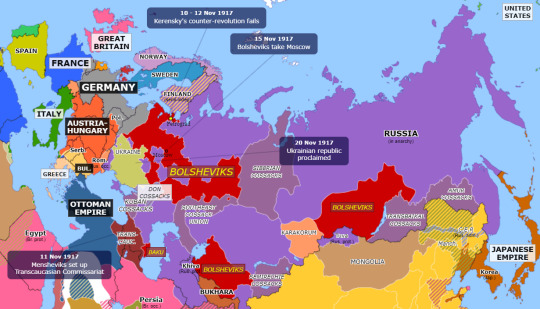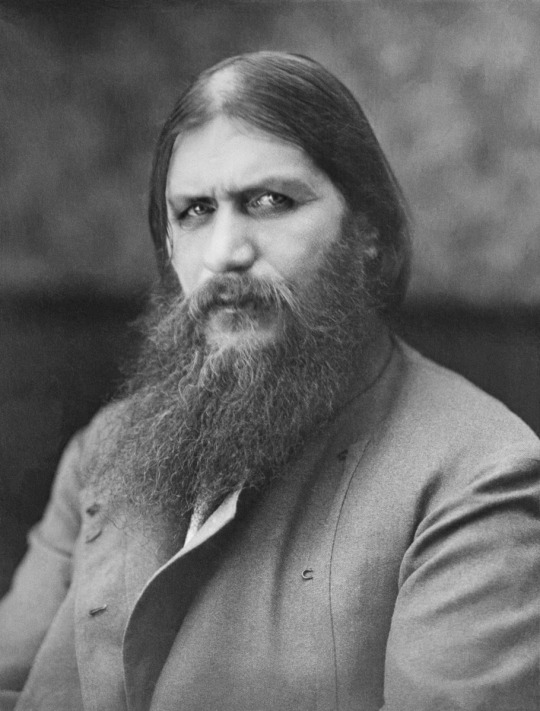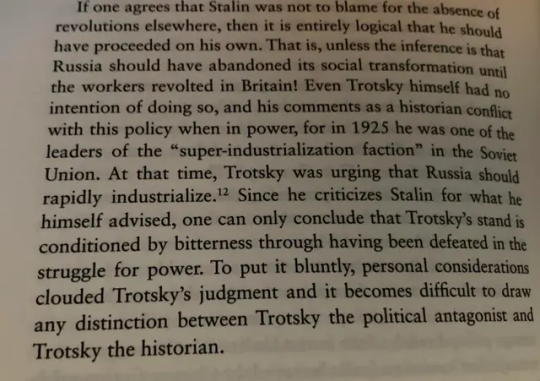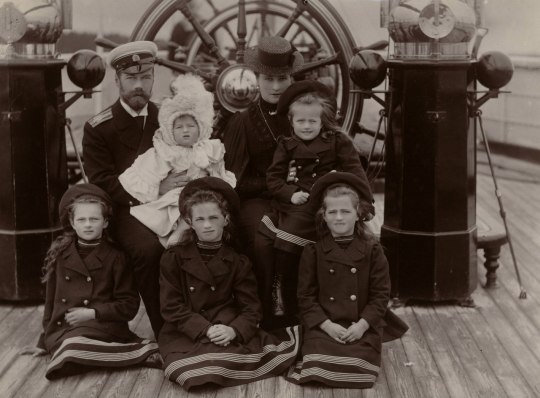#Mensheviks
Text
On This Day In History
November 17th, 1903: The Russian Social Democratic Labour Party splits into the Bolsheviks (the majority, the "hards", led by Vladimir Lenin) and the Mensheviks (the minority, the "softs", led by Julius Martov).
89 notes
·
View notes
Text
Focus on centralization and unity must shift with objective conditions: Look at the Bolsheviks and Mensheviks. During a revolutionary situation, when unity of action is most important, disunity must be resolved through a split to preserve the majority. When revolution's far away, it's more useful to stay united and hash it out rather than splitting endlessly before anything can start.
#socialism#communism#Marxism#communist party#Bolsheviks#Mensheviks#democratic centralism#dialectical materialism#Marxism-Leninism#Trotskyism#Maoism
6 notes
·
View notes
Text

In December 1917, the Bolsheviks, led by Lenin, gained control over numerous major cities in Russia, marking the collapse of the Provisional Government. Resistance was most pronounced among diverse Cossack hosts, Menshevik forces in Transcaucasia, and independence movements within Russia's various ethnic minorities.
#socialism#communism#politics#marxism#soviet union#history#october revolution#russia#lenin#bolsheviks#mensheviks#cossacks#soviet
2 notes
·
View notes
Text
Bolsheviks and Mensheviks
'At the second congress of the Russian Social Democratic Workers' Party, which took place in Brussels and London in 1903, there was a split over the question of party organization. Iulii Martov, backed by Plekhanov, suggested as a qualification for party membership "regular personal assistance under the direction of one of the party's organizations," while his opponent, Vladimir Lenin, proposed a tighter formulation: "personal participation in one of the party's organizations." With goodwill this relatively subtle distinction could have been finessed. But the truth was that Martov and Lenin had fundamentally differing notions of the party's nature. Martov envisaged a mass working-class party, whereas Lenin had in mind a conspiratorial organization of activists, dedicated fulltime to party work. Lenin lost the vote, but because the members of the Jewish Bund, who were opposed to him, walked out over an unrelated issue, he was able to leave the congress claiming the majority. From then on his faction was known as the "Bolsheviks," or "men of the majority," while his opponents contented themselves with the faintly disparaging label "Mensheviks," "men of the minority".'
Russia and the Russians, by Geoffrey Hosking
#communism#marxism#bolsheviks#mensheviks#lenin#plekhanov#martov#revolutionary organisation#russian social democratic workers party
0 notes
Text
The Uses of History, 22 – Russia the Long-Suffering, 4 – 1905-1914
(Photo credit – Wikipedia – Rasputin)
Following the abortive Revolution of 1905, catalyzed by the defeat in the war with Japan (1904-1905), the Russian Empire clearly needed to undertake serious reform in virtually every aspect of its society. Mere economic reform and modernization of industry and finances would not suffice. There was no imperial will for democracy, but an elected Duma was…

View On WordPress
#Bolsheviks#Duma#Grigori Rasputin#Hemophilia#Kadets#Mensheviks#Russian Revolution#Russian Revolution of 1905#Stolypin#Tsar Nicholas II#Tsarina Alexandra
0 notes
Text
Not to harp on 1917 too much, but one of the major disadvantages the Mensheviks had in the lead up to the October Revolution was their strict adherence to Marxist theory - they believed deeply in the stadial view of history and the necessity of a period of rule by the bourgeoisie prior to the socialist revolution. They treated this prediction of the future by Marx as if it had the same empirical backing as Marx's analyses of the past.
Lenin and Trotsky, on the other hand, pulled out this theory of permanent revolution, which as far as I can tell is completely heretical and revisionist and served largely as an ad hoc theoretical justification for what they were planning.
And as it turns out, if you ask a bunch of revolutionary workers to choose between the guys saying "we can do this! let's take power now!" and the guys saying "actually your bosses who've been subjecting you to miserable conditions for decades now need to be in power for a bit" they'll choose the former!
#unironically: trotsky and lenin understood the point of theory much better than the mensheviks#it's about getting the eggheads to support whatever it is you actually have to do to win
20 notes
·
View notes
Text
plekhanov really just took volgin's name as his pseudonym this is so funny
#the way like every revolutionary russian party at the beginning of 20th century was trying to claim chernyshevsky#socialist revolutionaries. bolsheviks. mensheviks. anarchists.
0 notes
Note
comrade hazel! ive had some people in my branch reccomend I read trotsky but I'm reading him and I think both theoretically and practically he doesnt hold up. and he's petty. am I missing something?
Petty would be a great way to describe trotsky's later work. But, that's not to say the man is entirely ideologically bankrupt. A good example of this is his essay on fascism, which is a concise quick read with a Marxist analysis on the origins of fascism while it seized power across europe. trotsky was also a prudent military leader during the revolution and civil war and here his theories and practical work can also be studied.
However, trotsky's main thesis, that is, permanent revolution is flawed and doesn't hold much water, especially today. The primary problem with permanent revolution is its dogmatism and undialetical materialism. Socialism in one country arose as a necessary though non-ideal solution to the need for both development and the lack of proper productive forces to continue waging international revolution. The success of the socialist state in the Soviet Union is very much proof that you can and must have socialism in one country before you can properly "export revolution". Continuity of the revolution, another central tenant of permanent revolution, might make more sense in a semi-feudal society like tsarist russia, but makes little sense in developed bourgeois nations like the united states.
Trotsky, as a former menshevik, also has a "middle-ground" type ideological grounds which separated him from bolsheviks such as his distrust of the peasantry. Trotsky's work is very much of his time and (attempt to) address the concerns and problems existing from the messy period between the October Revolution and the construction of the Soviet state. Indeed, both Lenin and Stalin thoroughly criticized Trotsky's theoretical work on application to their conditions (you don't get the "p.s. trotsky sent in a silly letter" quip from nothing).
Trotsky and trotskyists today don't play a large role in political-economy (funnily enough, trotsky, due to his proximity and time spent in Latin America after exile, influenced many Latin Americans socialists). In the united states, trotskyism essentially fizzled out after the dissolution of the USSR. The reason is simple: trotskyism was a left-wing deviation to attack the the USSR on, just as maoism/maoists (im specifically not referring to MZT, but things like the former "austin red guards") are used as a left-wing attack on the PRC.

Walter Rodney, The Russian Revolution: A View From The Third World
86 notes
·
View notes
Text
[The Bolsheviks] justify despotism of State power by the circumstance that capitalism is not yet completely eliminated, and promise freedom as soon as socialism has no more enemies. But what does that mean? In reality, it is not only the true supporters of capitalism, but all socialists of any dissentient orientation that the ruling party considers to be its enemies. From this point of view, the complete triumph of socialism — say, in Russia — requires sweeping elimination not only of all bourgeois-minded populations, but of all Mensheviks, Socialist Revolutionaries, anarchists, syndicalists, perhaps some opposition inside the Communist Party itself, and all discontented city and village residents.
Marie Goldsmith, under the pseudonym Maria Korn, predicting the Stalinist purges of 1937 a full twelve years before they would happen in Marxist Utopia. Emphasis mine.
85 notes
·
View notes
Text

The New Peril
Record Group 46: Records of the U.S. SenateSeries: Berryman Political Cartoon Collection
Having just defeated German militarism in World War I, civilization was threatened by another peril, Bolshevism. The desolation and destruction throughout Europe caused by the war provided socialists and communists with audiences open to their cries for a better society. In-fighting between Menshevik and Bolshevik forces continued to mean a hard existence for the Russian people. Cartoonist Clifford Berryman shows a vigilant toga-garbed figure of civilization with shield and sword, ready to do battle with Bolshevism, represented by a wild-eyed, wild-haired terrorist while a defeated German military officer handcuffed to a ball and chain looks on from the other side of the room.
This political cartoon shows a female figure in classical dress, holding a sword and a round shield, labeled “Civilization.” To the right is the defeated German officer in full military uniform. His hands are chained to a large iron ball. “Civilization” is turning to face the figure on the left, a wild-eyed Russian peasant labeled “Bolshevism.” He is bearded, and his hair stands on end. His stance is aggressive, but he is unarmed.
#archivesgov#January 10#1919#1910s#WWI#world war 1#great war#russian revolution#bolsheviks#clifford berryman#political cartoons
37 notes
·
View notes
Text
abbaccio, trish, fugo and giorno, but in my au



don't heat me for abba with a mustache 🙏🙏🙏
in jjrcw trish's name's tatyana uvarova, she is 21 years old. tanya comes from an ancient noble family, her father (diavolo) and brother (doppio) are high-ranking military officials with status and salary. fugo in this au is called felix peshkov. he comes from an impoverished noble family, he was engaged to tanya as a child, but the guys themselves are just childhood friends. after the october revolution and meeting ivan (giorno), tanya went over to the side of the red army and became a vanya's assistant (vanya himself became commissar). uvarova changed her last name to chernykh. for felix, these actions provoked a fierce protest; he felt betrayed, because his political views were a social democrat and he was a member of the menshevik party. felix does not accept the new power, unlike the rest of their company, which is why he remains left behind (like the canonical fugo in part 5)
giorno in jjrcw is uzbek. among the commissars he is called ivan ivánov, but his real name is khilol sagdiev. at the age of 15, he moved from tashkent to st. petersburg, where he worked in the lowest paid positions and at the same time stole to survive. at 19, he was caught by the police and went to prison, but was amnestied during the february revolution of 1917. thus, in 1917 khilol was released, changed his name to ivan and began to hang around among the communists. after the october revolution, he became an important person, although he was only 21 years old, and then, under cover, he infiltrated the structure of the white army with the goal of destroying it from within. i must say that his experiment really produced results.
abbaccio's name (in my au) is lev ababcov, he's about his 40s. ababcov is don cossack, in the plot he plays the role of a kind of “splinter of the empire”. his whole drama lies in the fact that he, going through a midlife crisis and being at the same time a man of old, ossified orders and views, turns out to be unprepared for the revolution of '17 and during the war he cannot find a new place for himself, because the class, to which lev ababkov belonged no longer exists. cossacks without royal power turn out to be of no use to anyone.
#jjrcw#jojo russian civil war au#jjba au#jojo no kimyou na bouken#jojos bizarre adventure#jjba#jjba fanart#jojo fanart#giorno giovanna#pannacotta fugo#trish una#leone abbacchio
17 notes
·
View notes
Note
What was the exact reason the Romanov Family were executed? because I'm curious because a lot of ppl say it was from some human stampede or something?
Short answer: No
Long Answer: They were executed because the Bolshevik party led by Vladimir Lenin was keeping them in captivity at a place called The Ipatiev House, or as it was known to them, “The House of Special Purpose”. This special purpose was to keep the Romanov family here and eventually kill them. Because the White Army (the army that supported the tsarist regime and wanted to restore the monarchy) was slowly approaching Bolshevik territory, AKA Yekaterinburg (where the Ipatiev House was), the orders to kill the Romanov family came quickly because the Bolsheviks didn’t want them falling into the hands of the Mensheviks (the whites). NAOTMAA and their faithful servants were essentially human pawns. During the early morning of July 17th 1918, Yakov Yurovsky (commandant of the house) and his men loaded their guns and fired on the family in the basement.


Thank you for asking!!! (and sorry for the late reply!)
#answered ask#olga nikolaevna#tatiana nikolaevna#maria nikolaevna#anastasia nikolaevna#alexei nikolaevich#otma#romanov#otmaa#tsar nicholas ii#alexandra feodorovna#yekaterinburg#1918#ipatiev house#bolsheviks
29 notes
·
View notes
Text
Events as they happened, day-by-day, beginning with the 1917 October Revolution, possibly continued into the Russian Civil War.
As of now, the Bolsheviks control Petrograd and have just won Moscow. Grigory Zinoviev, Lev Kamenev, and others have just resigned from the government to protest Lenin’s position on negotiating a coalition with the Mensheviks and SRs. And, in southern Russia, Kaledin and the Don Cossacks are forming what will become the White Army…

#socialism#communism#marxism#politics#soviet union#history#october revolution#Bolsheviks#Vladimir Lenin#Petrograd#Moscow#Russian revolution#Russian civil war#red October
21 notes
·
View notes
Text
if you ever need menshevik style emotional assistance please ask
8 notes
·
View notes
Text
The Uses of History, 20 – Russia the Long-Suffering, 2 – 1825 to 1905
The Uses of History, 20 – Russia the Long-Suffering, 2 – 1825-1905
Everybody has always underrated the Russians. They keep their own secrets from foe and friends.
Winston Churchill, 1942
(Image credit – WIkipedia, Lenin at Tempere, 1905)
Churchill called himself a “friend of Russia”, but he was well known for his loathing of Communism. He recognized Stalin as a wily leader, but never trusted…

View On WordPress
#Bolsheviks#Emancipation of Serfs in Russia#Gustavus Adolphus#History of Russia#Lenin#Mensheviks#Napoleon#Rise of Japan#Russian Imperialism#Tsar Alexander II#Winston Churchill
0 notes
Text
I'm surprised people are still reblogging notall "the lucanamarca massacre was morally correct" mensheviks.
10 notes
·
View notes